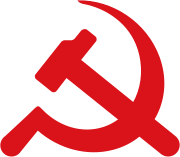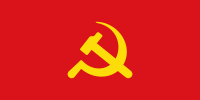
Back الحزب الشيوعي لكمبوتشيا Arabic Комунистическа партия на Кампучия Bulgarian Partit Comunista de Kamputxea Catalan Kommunistische Partei Kampucheas German Partido Comunista de Kampuchea Spanish Kambodža Kommunistlik Partei Estonian حزب کمونیست کامبوج Persian Parti communiste du Kampuchéa French कम्पूचिया की साम्यवादी पार्टी Hindi Partai Komunis Kamboja ID
Communist Party of Kampuchea បក្សកុម្មុយនីស្តកម្ពុជា | |
|---|---|
 | |
| General Secretary | Pol Pot |
| Deputy Secretary | Nuon Chea |
| Founded | 28 June 1951 (as KPRP)[1] 30 September 1960 (as separate party) |
| Dissolved | 6 December 1981 |
| Split from | Indochinese Communist Party |
| Succeeded by | Party of Democratic Kampuchea |
| Newspaper | Tung Padevat |
| Youth wing | Communist Youth League of Kampuchea |
| Ideology | |
| Political position | Far-left |
| Colors | Red |
| Party flag | |
 | |
The Communist Party of Kampuchea (CPK),[a] also known as the Khmer Communist Party,[6] was a communist party in Cambodia. Its leader was Pol Pot, and its members were generally known as the Khmer Rouge. Originally founded in 1951, the party was split into pro-Chinese and pro-Soviet factions as a result of the Sino–Soviet split with the former being the Pol Pot faction, and the latter adopting a more revisionist approach to Marxism.[1] As such, it claimed that 30 September 1960 was its founding date; it was named the Workers' Party of Kampuchea[b] before it was renamed the Communist Party in 1966.[7]
The party operated underground during most of its existence, and it took control of the country in April 1975 and established the state known as Democratic Kampuchea. The party lost power in 1979 with the establishment of the People's Republic of Kampuchea following the intervention of Vietnamese military forces. The party was officially dissolved in 1981, with the Party of Democratic Kampuchea claiming its legacy.
- ^ a b Chandler, David P.; D.P.C. (1983). "Revising the Past in Democratic Kampuchea: When Was the Birthday of the Party?". Pacific Affairs. 56 (2): 288–300. doi:10.2307/2758655. JSTOR 2758655. Retrieved 2 July 2021.
- ^ Edwards, Matthew (March 2004). "The rise of the Khmer Rouge in Cambodia: internal or external origins?". Asian Affairs. 35 (1): 56–67. doi:10.1080/0306837042000184266. eISSN 1477-1500. ISSN 0306-8374. S2CID 159796058.
- ^ Mowell, B.D. (7 October 2021). "Religious communities as targets of the Khmer Rouge genocide". The Routledge Handbook of Religion, Mass Atrocity, and Genocide. London: Routledge. pp. 195–204. doi:10.4324/9780429317026-22. ISBN 978-0-429-31702-6. S2CID 241862855.
- ^ "Khmer Rouge leaders convicted of genocide in landmark court ruling". South China Morning Post. 2018-11-16. Retrieved 2024-10-23.
- ^ "Cambodia and the Khmer People's Revolutionary Party (KPRP), Appendix B - Major Political and Military Organizations". Country Data. Archived 28 September 2009 at the Wayback Machine.
- ^ "Khmer People's Revolutionary Party (KPRP)". globalsecurity.org. Retrieved 28 May 2020.
Cite error: There are <ref group=lower-alpha> tags or {{efn}} templates on this page, but the references will not show without a {{reflist|group=lower-alpha}} template or {{notelist}} template (see the help page).